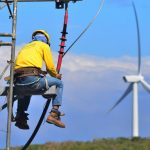MANILA, PHILIPPINES (16 June 2020) — Greater investment in clean energy infrastructure will contribute to Asia and the Pacific’s recovery from the coronavirus disease (COVID-19) pandemic and make economies more resilient against future shocks, participants at the Asia Clean Energy Forum (ACEF) 2020 heard today.
“It is clear that the COVID-19 crisis has made tackling climate change and other development issues an even bigger challenge,” said Asian Development Bank (ADB) President Masatsugu Asakawa in his opening remarks. “However, the situation offers opportunities and we must now seize the chance to rebuild smartly. As the region’s leading clean energy event, ACEF is the ideal forum to discuss these opportunities and ensure that clean energy plays a core role in helping Asia and the Pacific emerge stronger than before.”
Co-hosted by ADB, the United States Agency for International Development, and the Korea Energy Agency, ACEF takes place from 15–19 June welcoming more than 4,000 delegates to the online-only event, including policymakers, energy specialists, private sector participants, and members of civil society organizations from around the world.
On its 15th anniversary, ACEF is being held as a virtual, livestreamed-only event in response to the COVID-19 pandemic and to ensure energy efficiency. Registered delegates can access all 28 sessions and side events, participate in panel Q&As, and network with other participants through a dedicated web app and state-of-the-art technology. This format ensures participants’ health and safety and reduces the costs and greenhouse gas emissions associated with holding a physical event.
This year’s theme, Vision 20/20: Cross-sectoral Innovations for a Sustainable Future, explores the roadmap for achieving countries’ energy-related nationally determined contributions under the Paris Agreement; innovations at the nexus of energy, transport, and urban development; and building energy sector resilience, particularly in fragile and small island countries.
ADB Vice-President for Knowledge Management and Sustainable Development Bambang Susantono welcomed participants to the event and highlighted the forum’s emphasis on energy challenges in Asia and the Pacific amid the COVID-19 pandemic. In his keynote address, International Energy Agency Executive Director Fatih Birol stressed the importance of addressing climate change and air pollution in the recovery. A panel discussion, including Sri Lanka’s Permanent Secretary of Ministry of Power & Energy Wasantha Perera and International Solar Alliance Director General Upendra Tripathy, explored the prospects for development finance and capacity building in the region.
ACEF 2020 will launch a new innovation challenge: Digitizing Waste Collection through Handling, Tracking, and Recycling to Disposal. Proposals are invited for digital solutions to improve waste management, reduce the amount of material sent to landfills, and increase sustainability in order to create more resilient communities. Visit the Open Innovation Challenges platform, sponsored by ADB’s Digital Innovation Sandbox Program, to learn more.
Visit the ACEF 2020 website to see the full agenda, register, and access panelists’ presentations.
ADB invested more than $23 billion in clean energy from 2008 to 2019. Last year, ADB’s climate financing reached a record $6.56 billion, meeting its target of doubling its annual climate investments from 2014 one year ahead of schedule. Under Strategy 2030, ADB is targeting $80 billion in cumulative climate financing from its own resources by 2030 and for at least 75% of its country operations to feature climate adaptation and mitigation initiatives.
ADB is committed to achieving a prosperous, inclusive, resilient, and sustainable Asia and the Pacific, while sustaining its efforts to eradicate extreme poverty. Established in 1966, it is owned by 68 members—49 from the region.





